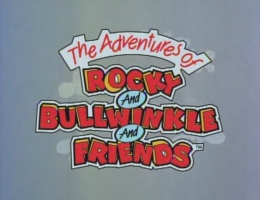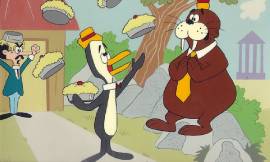
The Adventures of Rocky and Bullwinkle and Friends is an American animated television series that originally aired from November 19, 1959, to June 27, 1964, on the ABC and NBC television networks. Produced by Jay Ward Productions, the series is structured as a variety show, with the main feature being the serialized adventures of the two title characters, the anthropomorphic flying squirrel Rocket J. ("Rocky") Squirrel and moose Bullwinkle J. Moose. The main antagonists in most of their adventures are the two Russian-like spies Boris Badenov and Natasha Fatale, both working for the Nazi-like dictator Fearless Leader. Supporting segments include "Dudley Do-Right", "Peabody's Improbable History", and "Fractured Fairy Tales", among others. The current blanket title was imposed for home video releases more than 40 years after the series originally aired and was never used when the show was televised; television airings of the show were broadcast under the titles of Rocky and His Friends from 1959 to 1961 on Tuesday and Thursday afternoons on ABC, The Bullwinkle Show from 1961 to 1964 on Sunday evening and then late Sunday afternoon on NBC, and The Rocky and Bullwinkle Show as repeats from 1964-73 on Sunday mornings on ABC and in syndication following this.

Dudley Do-Right is a fictional character created by Alex Anderson, Chris Hayward, Allan Burns, Jay Ward, and Bill Scott, who appears as the main protagonist of "Dudley Do-Right of the Mounties", a segment on The Rocky and Bullwinkle Show.

Underdog, also known as The Underdog Show, is an American Saturday morning animated television series that ran from October 3, 1964, to March 4, 1967, starting on the NBC network until 1966, with the rest of the run on CBS, under the primary sponsorship of General Mills, for a run of 62 episodes. It is one of the early Saturday morning cartoons. The show continued in syndication until 1973.
Tooter Turtle is an American animated television series about a turtle which first appeared on TV in 1960, as a segment of the King Leonardo and His Short Subjects program. "Tooter Turtle" debuted on NBC, on Saturday, October 15, 1960, and ran for 39 original episodes through July 22, 1961. These episodes were later rerun as backups on other cartoon shows, but no more original episodes were made.

Pixie and Dixie and Mr. Jinks is one of the three segments of The Huckleberry Hound Show. This show was produced by Hanna-Barbera Productions between October 2, 1958, and October 13, 1961, and consist of 57 episodes.

Dayton Allen was an American comedian and voice actor. He was one of the "men in the street" on The Steve Allen Show. His catchphrase was "Why not, Bubbe?"

The Peter Potamus Show is a 1964–1966 animated television series produced by Hanna-Barbera and starring Peter Potamus, a purple hippopotamus.
"The Itchy & Scratchy & Poochie Show" is the fourteenth episode of the eighth season of the American animated television series The Simpsons. It originally aired on the Fox network in the United States on February 9, 1997. In the episode, The Itchy & Scratchy Show attempts to regain lost viewers by introducing a new character named Poochie, voiced by Homer. The episode is largely self-referential and satirizes the world of television production, fans of The Simpsons, and the series itself. It was written by David X. Cohen and directed by Steven Dean Moore. Alex Rocco is a credited guest voice as Roger Meyers Jr. for the third and final time ; Phil Hartman also guest stars as Troy McClure. Poochie became a minor recurring character and Comic Book Guy's catchphrase, "Worst episode ever", is introduced in this episode.

William Watts "Buck" Biggers was an American novelist and co-creator of the long-running animated television series Underdog.

Bullwinkle's Entertainment, previously known as Family Fun Centers & Bullwinkle's Restaurant and formerly Bullwinkle's Family Food n' Fun is a chain of family entertainment centers. Locations feature a sit-down restaurant, complemented by arcade games, go-karts, bumper boats, mini golf, laser tag, a ropes course, a zip line, and small rides for children. Games and activities are generally themed around the company's namesake, The Rocky and Bullwinkle Show.
Commander McBragg is a cartoon character who appeared in short segments produced by Total Television Productions and animated by Gamma Productions. These segments first appeared in 1963 on the animated series Tennessee Tuxedo and His Tales, then on the Underdog animated television show from 1964 to 1973, and have appeared in some syndicated prints of The Bullwinkle Show, Hoppity Hooper and Uncle Waldo's Cartoon Show.
Klondike Kat is a cartoon produced by Total Television and originally aired as part of The Beagles on CBS-TV in 1966, and later found in the U.S. syndicated Underdog and Tennessee Tuxedo cartoon series, in between episodes as an animated short.

CB Bears is an American animated television series produced by Hanna-Barbera Productions which aired on NBC from September 10 to December 3, 1977.
The Beagles is a Saturday morning animated television series that aired on CBS from September 10, 1966, to September 2, 1967. The show was produced by Total Television, which created King Leonardo and His Short Subjects, Tennessee Tuxedo and His Tales, and Underdog. The show was cancelled by CBS after one season, despite finishing in the top 10 for Saturday mornings. It then went into reruns on ABC from September 9, 1967, to September 2, 1968. It was also the last animated series produced by Total Television before it was dissolved in 1969.

Mark Arnold is an American writer and commentator who grew up in Saratoga, California. He has contributed to several publications in the United States, including The Comics Journal, Hogan's Alley, Back Issue!, and Comics Buyer's Guide. Arnold also worked with Jerry Beck and Leslie Cabarga on their Harvey Comics Classics series for Dark Horse Comics.
Total Television was an American animation studio founded in 1959 by Buck Biggers, Chester "Chet" Stover, Joe Harris, and Treadwell D. Covington. They were executives in the advertising agency Dancer Fitzgerald Sample who had the account for the General Mills food corporation. Total was formed to create cartoon characters encouraging children to buy General Mills breakfast cereals and other products. The company mostly created cartoons for television networks such as NBC. Underdog, King Leonardo and His Short Subjects, and Tennessee Tuxedo and His Tales were among the most popular series made by the studio.

Tennessee Tuxedo and His Tales is an animated television series that originally aired Saturday mornings on CBS from 1963 to 1966 as one of the earliest Saturday morning cartoons. It was produced by Total Television, the same company that produced the earlier King Leonardo and the later Underdog, and primarily sponsored by General Mills. A co-sponsor was Pillsbury's Funny Face Drinks. The title is a play on the “tuxedo” dinner jacket worn as formal wear.
The Space Kidettes is an American Saturday morning animated television series produced by Hanna-Barbera Productions, originally airing on NBC during the 1966–67 season. In the show, junior rangers Snoopy, Jenny, Countdown and Scooter patrol the cosmos from their space-capsule clubhouse, with help from their dog Pupstar. Twenty episodes were produced.
Joseph Benjamin Harris III was an American illustrator and storyboard artist. He is best known for creating the Trix Rabbit, the cartoon mascot for General Mills' Trix breakfast cereal, who debuted in 1959. He also penned the Trix rabbit's memorable commercial tagline, "Silly rabbit! Trix are for kids", which is still utilized in General Mills' advertising campaign, as of 2017. Additionally, in 1959 Harris, Chet Stover, and W. Watts Biggers co-founded Total Television, which produced Saturday morning cartoons. Harris created some of Total Television's best known characters and series, including King Leonardo and His Short Subjects (1960–1963), Klondike Kat (1963–1965), and Tennessee Tuxedo and His Tales (1963–1966). His best known character creation aside from the Trix Rabbit was Underdog, the canine star of the animated series, Underdog, from 1964 to 1967.











